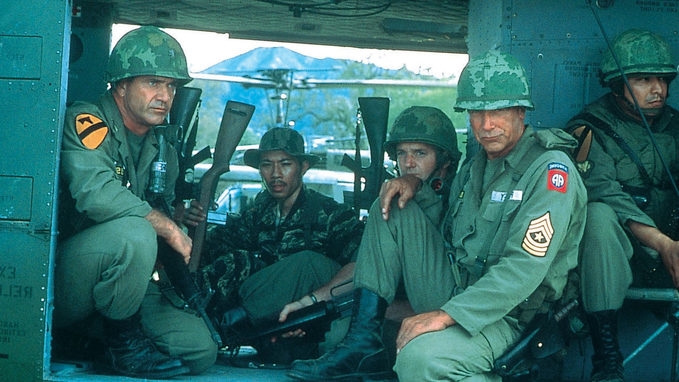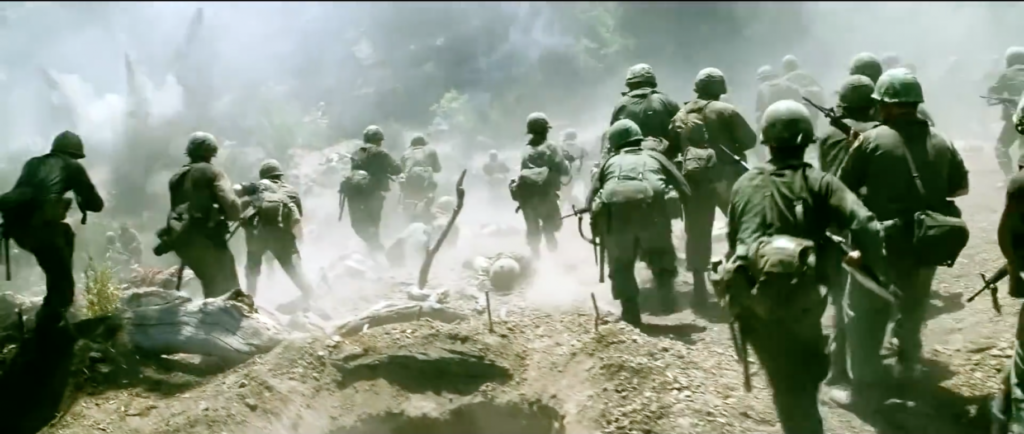We Were Soldiers (2002)

DIRECTOR: Randall Wallace
CAST: Mel Gibson, Sam Elliott, Madeleine Stowe, Greg Kinnear, Barry Pepper, Chris Klein, Keri Russell, Ryan Hurst, Don Duong
REVIEW:
From writer-director Randall Wallace (writer of Braveheart and Pearl Harbor) comes this intense and powerful Vietnam war film covering the previously relatively obscure Battle of the Le Drang Valley—-not inappropriately known as the Valley of Death—-in November 1965, in which Americans and North Vietnamese met each other in major combat for the first time, with 300 men of the Seventh Cavalry under Lieutenant Colonel Hal Moore desperately holding their surrounded position against wave after wave of a total of 4,000 North Vietnamese troops.
While some war films such as Black Hawk Down and Saving Private Ryan plunge us straight into battle, We Were Soldiers begins in America, letting us see the principal characters with their wives and children and ensuring they are established as individuals before being placed in harm’s way. The central figure is their commander, Lieutenant Colonel Hal Moore (Mel Gibson), a well-educated, devoutly religious man who scarcely bats an eye as bullets whizz past his head but cares deeply for the young men under his command. Moore, a Korean War veteran, has studied the errors of the French military which led to its massacre by the North Vietnamese years earlier and is determined not to lead his soldiers to the same fate, but is none-too-pleased to learn his regiment has been given the same name as that of the ill-fated General Custer. Also figuring prominently is Moore’s second-in-command, the crusty Sergeant Plumley (Sam Elliott), veteran of airborne operations in WWII and Korea, young and idealistic Lieutenant Geoghan (Chris Klein), daredevil helicopter pilot Crandall (Greg Kinnear), and the wives of Moore and Geoghan (Madeleine Stowe and Keri Russell). Once we get to Vietnam, three other characters stand out: naively eager war correspondent Joe Galloway (Barry Pepper, at the other end of the extreme from his battle-hardened sniper in Saving Private Ryan), young officer Savage (Ryan Hurst), who must hold out against constant enemy assaults, and the North Vietnamese commander, Colonel Ahn (Don Duong), the same man who masterminded the defeat of the French a decade earlier.
When it comes to the rightness or wrongness of the notoriously controversial and divisive war in Vietnam, We Were Soldiers is not interested in any pontificating. The movie is not devoid of commentary on issues of the day—-an African-American soldier is allowed to die for his country side-by-side with whites, but not to wash his clothes in the same laundromat—-but when it comes to the United States’ presence in Vietnam, the film is apolitical. Its sole aim is to pay tribute to the American soldiers involved in the battle, and it does so with a forcefulness and intensity approaching Saving Private Ryan or Black Hawk Down. At the same time, it aspires to be even-handed; the movie is dedicated to the soldiers of both sides, and while it unsurprisingly gives the lion’s share of the focus to its American characters, the North Vietnamese soldiers are portrayed with a measure of humanity. Colonel Ahn appears to be every bit as quick-thinking and capable as Moore, with equally canny instincts for anticipating his opponent’s moves—-we get a bit of a cat-and-mouse game as Moore in his headquarters and Ahn in his underground tunnel bunker try to outsmart each other with their knowledge of past conflicts and their own instincts. Ahn knows the terrain and has the element of surprise, but is surprised himself at the Americans’ tenacity. The movie draws some more parallels between the two enemy commanders; we see both men praying before battle, we see both murmuring encouragement to their wounded and weary men, and in one scene both Moore and Ahn gaze thoughtfully at the moon. The filmmakers give us a brief shot of a young Vietnamese soldier placing a picture of a girlfriend in his pocket, and later as Moore writes condolences to the widow of one of his men, the scene shifts to that Vietnamese girl mourning her own lost soldier.
In a way, it’s surprising that Randall Wallace, screenwriter for a previous “war epic” as overblown and cliche-ridden as Pearl Harbor wrote and directed a war film this intense and gritty. Maybe it helps that he was adapting the account of the battle written by Colonel Moore and Joe Galloway (the real Moore, who had long been critical of Vietnam films for what he saw as negative portrayals of US servicemen, expressed his approval of the movie). The first act establishing the characters before throwing them into battle is the weakest section of the movie, and the one guiltiest of Wallace’s past screenwriting shortcomings, often clunky and cliched. “What’s war, Daddy?” Colonel Moore’s precocious little daughter asks in the kind of heavy-handed exposition we’ve come to expect from Wallace, along with portentous repeated references to Custer’s massacre at Little Big Horn, ominously heralding a similar catastrophe with all the subtlety of a sharp elbow in the ribs. Unlike Black Hawk Down, which plunged us into battle with minimal character development, We Were Soldiers wants to imbue its principals with more depth, to deepen the impact when some of them inevitably fall in battle, but to do this it sometimes falls back on lazy shorthand. You can be sure that when a soldier announces his wife back home is about to give birth, he’s marked as an inevitable goner with all the subtlety of a Star Trek extra wearing a red shirt. On the plus side, Wallace’s script serves up some snappy bits of dialogue: “I wonder what Custer was thinking when he realized he’d led his men to slaughter”, Moore ponders at one point. “Custer was a pussy”, is the crusty old Plumley’s characteristically acerbic reply. It’s also not a movie that inspires a lot of triumphant flag-waving. Moore’s men fight well and hold out, suffering heavy casualties but killing even more Viet Cong, but it’s not really a victory, merely the first major battle of a war in which American forces outgunned the enemy but were outnumbered, outmaneuvered, and eventually outlasted.

The battle scenes are the equals of those of any other war film in recent memory, and when it comes to graphic violence, We Were Soldiers does not soft-peddle, with the sight of a soldier horrifically burned by napalm being particularly difficult to watch. The battle scenes are masterfully staged, conveying the close-up intensity and chaos without losing the bigger strategic picture of the campaign, all strikingly photographed by Dean Semler. In between the intense combat, we also periodically cut away to the home front, where the Army is so unprepared for the flood of casualties that taxis have to deliver the news. The wives of Moore and Geoghan volunteer to deliver the dreaded telegrams to the appropriate women, but it always lurks in the back of both of their minds that one of the telegrams might turn out to be for them.

Mel Gibson is credible as Colonel Moore in a solid and authoritative performance, demonstrating that he’s a good enough actor despite his “movie star” status to sink into his character in a gritty war movie without being distracting. Sam Elliott, although minus his iconic mustache, is delightful as the crusty old Sergeant Plumley, who’s so gruff he gets a laugh every time he barks out one of his hard-bitten line deliveries. In the supporting cast, especially strong performances are supplied by Barry Pepper and the often fatuous Greg Kinnear showing an unusually edgy and heroic side. Pepper’s character is particularly important; Galloway provides an entry point for the audience as he enters bright-eyed and excited but is quickly shocked and horrified by the carnage he witnesses firsthand and ultimately feels too overwhelmed to believe he can ever do justice to Moore and his men, exemplified in an impactful late scene where he breaks down in tears in front of his typewriter. Chris Klein, Madeleine Stowe, and Keri Russell provide adequate support.
While it takes a while to fully take flight, when it does so, We Were Soldiers packs a powerful and moving emotional wallop, its more banal moments falling by the wayside in the face of fierce battle scenes. If it’s not necessarily all that it could have been, it can be added to the short list of quality films focused on the US conflict in Vietnam.
* * *